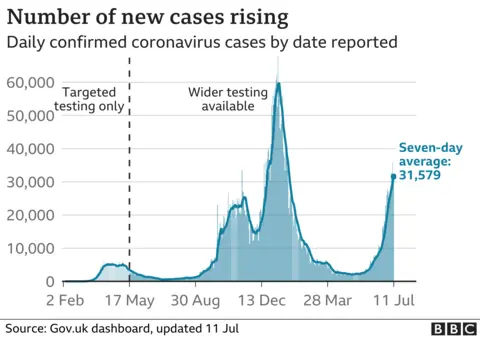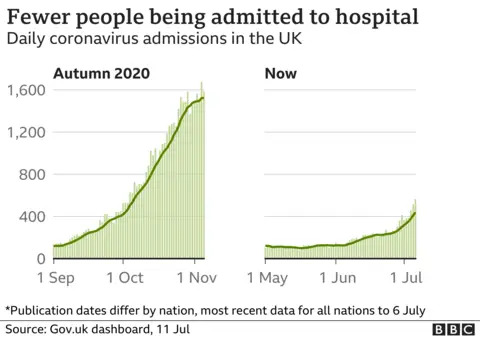Covid-19: Masks still expected to be worn indoors after 19 July - Zahawi
People in England should still wear masks in many indoor settings even after the Covid rules are lifted, the vaccines minister has said.
The PM is due to confirm on Monday whether most of England's lockdown rules - including the legal requirement for masks - will end on 19 July.
But Nadhim Zahawi said "an expectation" for people to wear masks in crowded spaces such as trains would remain.
Labour said it was "irresponsible" to lift the legal requirement for masks.
The legal need to wear a face covering in certain places is due to remain, for the time being, in Wales, Scotland and Northern Ireland.
Speaking on the BBC's Andrew Marr Show, Mr Zahawi said wearing masks "will help the whole country".
He added the government wanted to stress "both a personal responsibility and a corporate responsibility" for the matter.
"The fortification of the vaccine programme has allowed us to cautiously move to step four [of the lockdown easing], and the PM will say more about this [on Monday]," he said.
"The guidelines will be very clear on things like mask-wearing. There's an expectation of people to wear masks indoors, in crowded places, on public transport."
Pressed on whether this was a change in stance, Mr Zahawi said: "We're moving from 'you must' to 'you are expected' to wear a mask in indoor spaces."
'Irresponsible'
It comes after Health Secretary Sajid Javid told the Sunday Telegraph anyone who would not wear a mask in an enclosed space was "just being irresponsible".
But Labour's shadow health secretary Jonathan Ashworth said: "Given Sajid Javid now considers it irresponsible to not wear masks then it would be equally irresponsible for his government to carry on with the plan to lift mask requirements while infections are heading to 100,000 a day."
The debate over masks comes amid concerns over the move to end most of England's remaining curbs later this month.


Behind the scenes, government scientists are broadly supportive of the lifting of restrictions.
But one area of particular concern is the policy on masks.
Not because mask wearing in some indoor settings will dramatically alter the course of rising infections, but because of the message it sends out.
The feeling is that it gives the impression infections no longer matter, and encourages people to think about themselves rather than others.
Communication and messaging is key during a public health crisis.
But it's important to recognise mask-wearing is not harm free.
For people who are hard of hearing, masks have caused real problems, for example.

Mr Javid has previously warned that virus cases could reach 100,000 a day over the summer, if the ending of restrictions goes ahead as planned on 19 July.
If that does happen, then hospital admissions could reach 2,500 a day, according to statistician Professor Sir David Spiegelhalter.
Prof Spiegelhalter told Andrew Marr it was "absolutely inevitable" that the UK would soon experience "a big wave of cases".
He said the hospital admission estimate was "very high" but "considerably lower" than the peak of the second wave.
Patients would also likely be younger and therefore require shorter stays in hospital, Prof Spiegelhalter added.
Asked whether the NHS could cope with such an eventuality, Mr Zahawi said: "The NHS, I think, can deal with this cautious but pragmatic reopening of the economy."




Despite the expected rise in hospital admissions, Mr Javid said what had "shocked" him the most since taking office two weeks ago was a warning about NHS waiting lists in England.
Currently, some 5.3 million people are waiting for routine operations and procedures in England - but Mr Javid warned that could more than double.
He said officials told him: "It could go as high as 13 million."
On Sunday, the UK recorded 31,772 new cases and 26 deaths within 28 days of a positive test.
It is the fifth day in a row case numbers have been above 30,000, while Friday saw the highest daily figure since 22 January.
App changes
Regardless of whether the NHS can cope with a rise in cases, very high case numbers could cause other problems over the summer.
A requirement to self-isolate if people have had both vaccine doses will only stop on 16 August, raising fears that millions will be asked to self-isolate this summer as they mix more after 19 July.
The BBC has learned that the NHS Covid-19 app will be altered to send out fewer isolation alerts, in order to help alleviate this problem.
Commenting on this, Mr Zahawi said the app "was developed and operationalised at a time when we didn't have vaccines".
And on Friday, Downing Street said that officials were examining whether NHS staff could be freed of the obligation to self-isolate if "pinged" by the Covid app.
